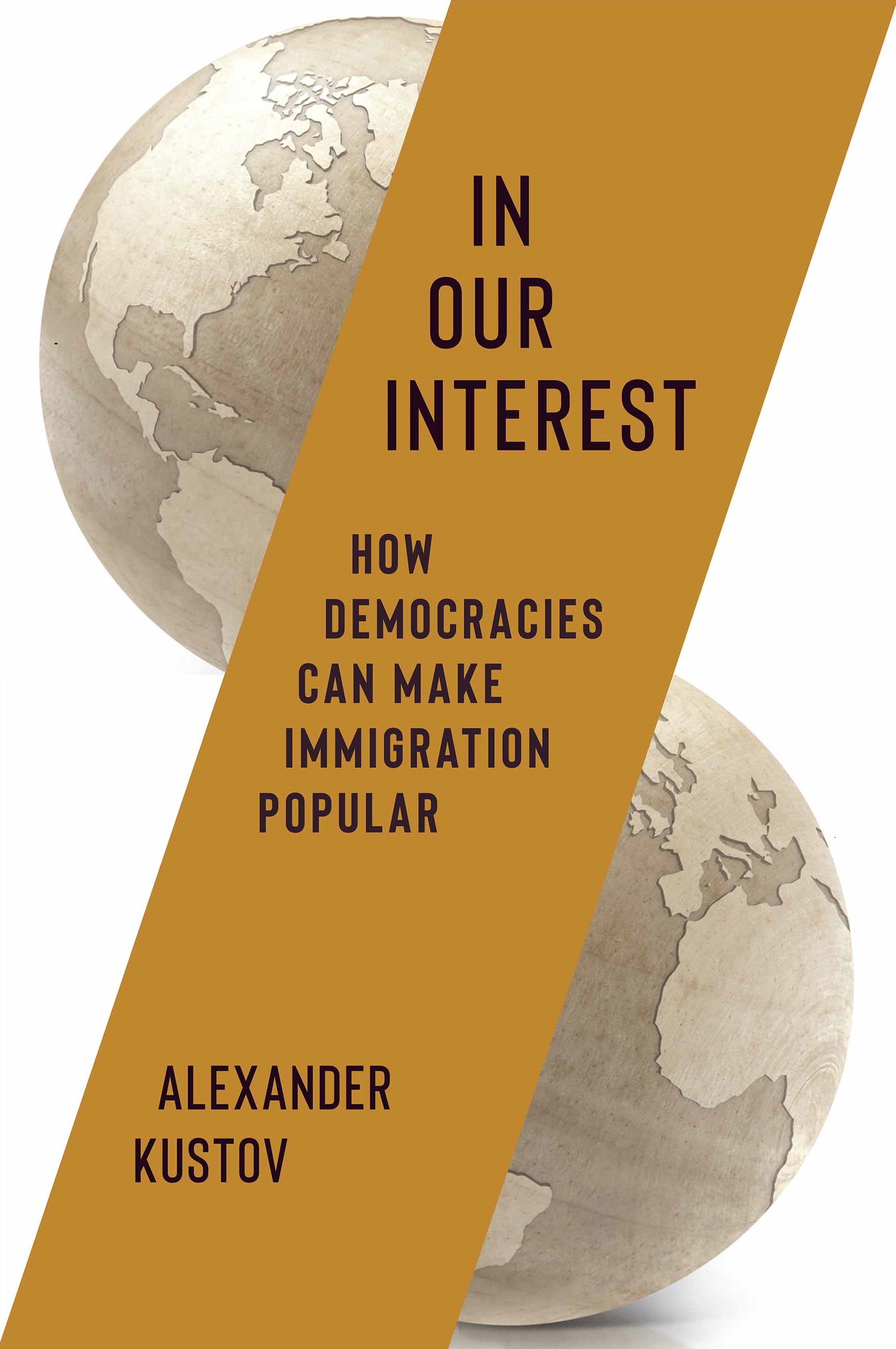Book
In Our Interest: How Democracies Can Make Immigration Popular (Columbia University Press, 2025)
The economic benefits of increased immigration are potentially massive, many experts say. The United States and other wealthy countries, however, have put up barriers against even the highest-skilled foreign workers. Such choices reflect public opinion, which typically favors stringent restrictions. Under what conditions do voters in affluent democracies back higher levels of immigration? How can advocates build support for pro-immigration policies?
In this data-driven, counterintuitive book, Alexander Kustov argues that showing people how immigration benefits them and their fellow citizens can lead to greater acceptance of more open policies. Looking beyond the stereotype of xenophobic voters, he identifies people's genuine concern for their compatriots as a key driver of attitudes toward immigration. Using extensive cross-national surveys and experiments, this book demonstrates that people are willing to bear costs to benefit others—but they prioritize helping their fellow citizens. Voters tend to oppose freer immigration because they believe it threatens the well-being of their communities, but they can be persuaded to support it if they see the outcomes of immigration policies as in their interest. Through in-depth comparison of Canada and Sweden, Kustov shows why pragmatic approaches that focus on attracting skilled, needed workers are more effective than humanitarian appeals and policies. Offering a realistic path forward that meets voters where they are, "In Our Interest" provides a new, optimistic perspective on the political prospects of pro-immigration reforms.
Essays and policy briefs: Foreign Affairs, Columbia University Press, Politics and Rights Review, Migration Policy Centre Blog, Migration Research to Policy Co-Lab, Reason.
Interviews: Bipartisan Policy Center, De Correspondent, Good Authority, New Liberal Podcast, Max Planck Institute, Konrad Foundation, Centre of Migration Research.
Talks & Events
If you're interested in arranging a book talk at your institution, feel free to reach out via email.
| Date | Venue | Location |
|---|---|---|
| May 5, 2026 | Institute For Advanced Study in Toulouse | Toulouse, France |
| April 13, 2026 | University of Notre Dame | Notre Dame, IN, USA |
| April 10, 2026 | American Enterprise Institute | Washington, DC, USA |
| March 6, 2026 | University of Kentucky | Lexington, KY, USA |
| January 29, 2026 | Rice University | Houston, TX |
| January 16, 2026 | SPSA's Author Meets Critics | New Orleans, LA |
| October 21, 2025 | Pontifical Urbaniana University | Vatican City |
| October 16, 2025 (online) | Multiple organizations | Washington, DC, USA |
| October 8, 2025 | Organization of American States | Washington, DC, USA |
| September 12, 2025 | APSA's Author Meets Critics | Vancouver, BC, Canada |
| July 8, 2025 (online) | Multiple organizations | Washington, DC, USA |
| June 5, 2025 | Institute for Humane Studies | New York City, USA |
| May 21, 2025 | WZB (Berlin Social Science Center) | Berlin, Germany |
| May 20, 2025 | Max Planck Institute for the Study of Religious & Ethnic Diversity | Göttingen, Germany |
| May 16, 2025 | Centre of Migration Research (University of Warsaw) | Warsaw, Poland |
| May 13, 2025 | MIDEM (Dresden University of Technology) | Dresden, Germany |
| May 8-9, 2025 | Max Planck Institute for the Study of Religious & Ethnic Diversity | Göttingen, Germany |
| May 6, 2025 | MZES (University of Mannheim) | Mannheim, Germany |
| April 4, 2025 (online) | Migration Policy Institute | Washington, DC, USA |
| March 20, 2025 | Inter-American Development Bank | Washington, DC, USA |
| March 13, 2025 | University of Michigan | Ann Arbor, USA |
| February 25, 2025 (online) | Norwegian University of Science & Technology | Trondheim, Norway |
| February 3, 2025 (online) | European University Institute | Florence, Italy |
To see a recording of one of my previous book talks, watch it here.
Editorial Reviews
Increased immigration: What do you do when the most economically beneficial policy in the world is virtually the least politically popular? Alexander Kustov's In Our Interest takes a can-do approach by experimentally investigating the best ways to close the gap. His answer: Countries should prioritize "demonstrably beneficial" high-skilled immigration so voters stop picturing liberalization as charity or national suicide. Even refugees benefit if the stereotypical immigrant is a star.
Not only is Kustov's book a highly rigorous and insightful analysis of general public attitudes toward immigration in affluent democracies; it is also loaded with practical recommendations for designing immigration policies that can win broad support. Kustov's cross-national approach and his use of experimental data are particularly illuminating. The timeliness of this book and its relevance to ongoing policy debates can hardly be overstated.
There's an abyss between what the empirical evidence tells us about the economic and social benefits of immigration and what the average person believes about immigration. Those tasked with convincing the public about the benefits of welcoming newcomers usually make an immigrant-centered argument that appeals to compassion. Kustov convincingly shows that only appeals that tell us immigration is good for us and our countries, when backed by good policies, will work to make immigration popular. This perspective isn't only refreshing. It's perfectly consistent with the facts on how immigration is a net positive. This is an important book for anyone interested in the future wellbeing of their country.
Anti-immigration politics are on the march. In this synthetic, deeply researched book, Kustov demonstrates that we misunderstand that opposition: citizens are not implacably anti-immigration. Kustov's path forward fosters support for immigration by addressing the altruistic concerns underpinning opposition. Moral clarity, conceptual novelty, and extensive evidence—from many strengths, one great book.
Empirically rigorous, theoretically generative, and normatively pragmatic, In Our Interest is that rare book that will reshape the debate. Kustov believes inclusion can be in our interest; the challenge he leaves us, is how to make our interests also inclusive.
Excerpts
To sample book's Introduction, see here. To read more about how not to persuade people on immigration, see an excerpt of Chapter 5:

 Substack
Substack Bluesky
Bluesky